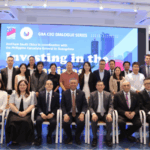Nearly everyone was unprepared for the upsets that toppled down well-established political dynasties, giving rise to the election of opposition leaders who were originally perceived as weak political outsiders.
In the race for governor, former flight stewardess Pamela Baricuatro garnered 1,107,728 votes, clobbering incumbent Gwendolyn Garcia who only got 764,884 votes.
A crucial point against Garcia was a six-month suspension issued by the Office of the Ombudsman two weeks before the election over a quarry permit that she has issued without an environmental clearance. Her refusal to step down, reminiscent of a similar suspension that she defied in 2018 did not sit well with the voting public.
Garcia has been a long-standing political figure whose prominence even galvanized Visayas governors to sign a manifesto supporting President Ferdinand Marcos, Jr. during his recent visit to Cebu. In contrast, Baricuatro was a virtual unknown, with no political experience other than heading a philanthropic foundation.
In Cebu City, Councilor Nestor Archival who had an unsuccess run for Vice-Mayor in 2016 came back stronger this year to beat incumbent Mayor Raymund Garcia, the governor’s nephew who used to be the Vice-Mayor but became the city’s chief executive when Mayor Michael Rama was dismissed over a nepotism case which the latter is still appealing in court.
Capturing 256,197 votes, Archival registered the largest election margin for mayor in Cebu City’s electoral history. Garnering 120,124 votes, Rama himself ran again for mayor this time but only came in third place after Archival and second-placer Garcia who earned 176,967 votes.
With formidable political pedigrees, both Garcias in the province and city had robust war chests and campaign machineries. As administration-backed incumbents, they had the advantage of vast government resources at their disposal.
Marcos himself chose to launch the government’s P20/kilo rice program in Cebu with Governor Garcia leading the roll-out just 11 days shy of election day, a strategic choice since the province holds the highest number of registered voters nationwide. Apart from local bets, the election was also for senatorial candidates with a nationwide constituency.
The cheaper rice was promptly labeled by the opposition as a vote-buying scheme, an accusation which also targeted Mayor Garcia who faced a disqualification case after the city government distributed sacks of rice to barangay residents.
For her part, Baricuatro who was dubbed as a nuisance at the start of the campaign had little in terms of funds and logistics. She didn’t even have poll watchers on election day.
But her biggest asset was by no means insignificant: former President Rodrigo Duterte who endorsed her in a high-profile rally in Mandaue City last February 22. When Duterte was later arrested and brought to the International Criminal Court in The Hague, Vice-President Sara Duterte took over and continued her father’s support for Baricuatro.
And while Baricuatro stood against the impeachment of Vice-President Duterte which was signed by 215 members of the House of Representatives last February 5, Garcia who was previously a Duterte ally appeared to have ignored the issue completely.
Driven by sympathy, pro-Duterte volunteers and donors soon came forward to support Baricuatro. Meanwhile, it didn’t help that Byron Garcia, the governor’s brother fiercely ranted online against Baricuatro as well as her followers and a radio personality whom he perceived as biased against his sister; instead of denting the challenger’s armor, his attacks ended up making her an underdog. Even his branding of anti-Garcia forces as Oplok (idiot) became a tongue-in-cheek badge of honor for the oppositionists.
Gaining traction on social media, Baricuatro who positioned herself as a “citizen-first” candidate thus advanced her way forward as an alternative to Garcia who is alleged to be lavish in tourism promotions like the Suroy-Suroy Sugbo and Pasigarbo Sa Sugbo programs but stingy in public hospital services.
Improving hospitals was not just a battle cry for Baricuatro. During the COVID-19 pandemic, her close friend, Dr. Rowena Burden called out Garcia on social media for alleged abuse of power and corruption. Burden then vowed to challenge Garcia in the 2025 election before suddenly dying of cardiac arrest after facing 20 cyber libel cases filed by the governor. Taking up the cudgels, Baricuatro became a proxy for Burden who had led medical missions in the province.
Meanwhile in Cebu City, urban problems such as garbage, floods, housing, traffic and transportation hogged the limelight in the heated political discourse.
Adding fuel to the fire is the still-unfinished construction of the Cebu City Medical Center (CCMC) which began after a tremor damaged its original structure in 2013. Another major issue is the Cebu Provincial Ordinance 93-1 which gives occupants of province-owned lots in the city a chance to buy their occupied properties at low rates in exchange for city-owned lots that will be turned-over to the provincial government; the land-swap proposal has been left hanging since 1993.
At the center of it all was Nestor Archival: an engineer, environmentalist and incumbent city councilor who presented himself as the most technically competent in providing solutions to the city’s major problems including the CCMC construction and the 93-1 deal which, his campaign points out, are all engineering-related.
The wind beneath Archival’s wings was his vice-mayoralty bet Tomas Osmena, a multiple-term former city mayor and congressman credited for vital infrastructure projects including the South Road Properties, a 300-hectare reclamation project which now hosts high-end malls, hotels and condominiums. Under Osmena’s previous mayorship, the city earned its “Ceboom” tag for being No. 1 in economic growth, a feat that the Archival-Osmena tandem now vowed to replicate.
Notable in the recent election is the voting public’s obvious fatigue with traditional political dynasties that the Garcias ended up symbolizing. In labeling Baricuatro as a “Governor of the People” who will fight for ordinary Cebuanos, her supporters successfully marketed her as a deviation from Garcia whose family has been politically prominent in the province since the 1960s.
A technocrat who vowed to pursue urban reforms, Archival who comes from a farming family also projected himself in the same mold as Baricuatro. His campaign focused on what many voters seem to now prefer as a new model of governance: less grandstanding, more service delivery.
Although also coming from a traditional political family, Osmena’s sterling public service record seemed to have exempted him from the public’s displeasure over political dynasties. Never running out of new ideas, Osmena’s pitch to make government services available 24/7 excited Cebuano voters enough to overlook the dynasty argument against him entirely.
The volunteer-driven candidacies of Baricuatro and Archival answered a growing call for a fresh and responsive governance in both the province and city which, under the Garcias, have been reeling from controversies such as in the implementation of the 93-1 land swap deal and the the Bus Rapid Transit Project, an ambitious city-initiated mass transport system which has been stalled by the provincial government.
The election of new governor and mayor is no guarantee of more smooth-sailing days ahead for Cebu, however, as their local legislatures are dominated by oppositionists. In the province, the elected Vice-Governor and provincial board members all come from Garcia’s party while in the city, Archival’s elected councilors comprise just one-third of the total city council.
Another element that will influence Cebu’s administrative interplay is the national political scenario. Where digital mobilization was a big factor, the nationwide polls mirrored emerging trends of the opposition gaining an upper hand: in the senatorial race, allies of detained former President Duterte and two liberal opposition candidates were among the top winners, dealing a blow to President Marcos Jr. whose slate underperformed in what is traditionally a midterm show of force.
In Cebu Province, 8 out of 12 topnotchers for senator belong to the Duterte camp while 1 came from the liberal opposition, leading some observers to dub the province as a “Duterte Country” along with other regions in Mindanao where the family of the detailed former president remain highly popular.
Compounding matters is the looming impeachment trial of Vice-President Duterte whose help has been acknowledged by Baricuatro as a huge factor in her victory. Although surveys have shown significant public support for her impeachment trial, the vice-president remains a political force to reckon with all the way to the 2028 presidential elections where she is poised to run as a candidate.
But Cebuanos can’t wait much longer for change. Whatever comes out of the presidential derby three years from now, Cebu appears hell-bent on regaining its renown as a primary center of economic development in the country soonest.
With Baricuatro and Archival at the helm of the province and city, respectively, results in the just-concluded local election have been a resounding call for an end to extravagance, misplaced priorities and bureaucratic foot-dragging.
Clearly, Cebu is off to a jumpstart in its history as a revitalized powerhouse of an inclusive and sustainable growth, with the health and welfare of the Cebuano at the heart of its governance.



